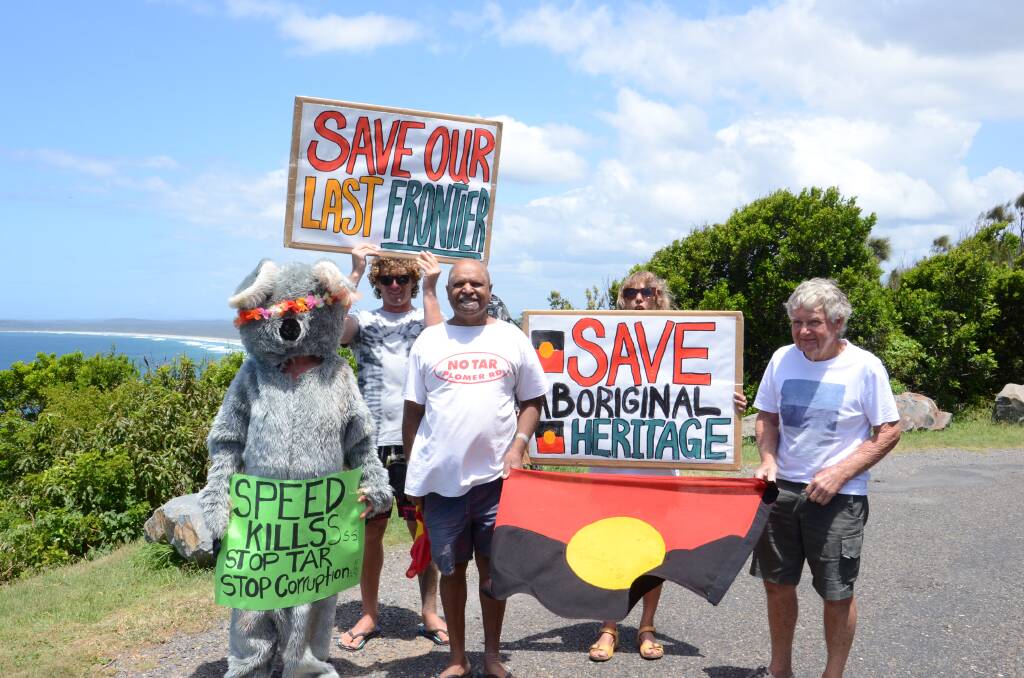
A passionate group of community members from Crescent Head will be coming together for a Koala Picnic on Sunday to campaign against the tarring of Point Plomer Road.
Subscribe now for unlimited access.
$0/
(min cost $0)
or signup to continue reading
The sealing of Point Plomer Road has been considered and debated by Kempsey Shire Council since 1997, with council making the decision last year to move forward and tar the northern section of the road from the end of the existing bitumen to Racecourse, and the southern section of the road to Big Hill.
Read more: Construction to start on Point Plomer Road
Some members of the Crescent Head community have protested against the tarring of the road due to local Indigenous sites along the stretch of road which were highlighted recently by a study conducted by Associate Professor Michael Westaway and the impact tarring the road will have on native wildlife.
"We're devastated that council hasn't listened to us about the cultural significance of the area," Dunghutti Elder James Dungay said.
"We believe tarring the road will lead to the destruction of Aboriginal sites in that area."
These statements are echoed by fellow Dunghutti Elder Reg Wooderson.
"Some of the Aboriginal sites are close to the road and we're concerned about the impact tarring the road will have on these sites," he said.
Council's director Operations, Robert Fish, said there will be no design changes to the road in its current state and work will not impact surrounding areas.
"The proposal to seal Point Plomer Road does not constitute a new road, rather it is an upgrade of an existing road," he said.
"The road design has sought to maintain the existing road alignment as far as practicable to minimise impacts on habitat and the surrounding environment."
Council also undertook a survey of the road, prepared engineering design plans and carried out environmental investigations - culminating in a draft Review of Environmental Factors (REF) being prepared last year.
The REF presented to council found that sealing the road will not have an environmental impact.
"A key action in council's Macleay Valley Economic Development and Tourism Strategy, adopted in 2019, is to work with stakeholders and agencies to facilitate the establishment of Indigenous business in the tourism sector, building on Indigenous cultural heritage," general manager Craig Milburn said at the August 2020 council meeting.
"Council recognises that the surrounding environment of Plomer Road is of high value and cultural significance for the Dunghutti people and the broader community."
The state government has also identified the area as significant koala habitat, with locals concerned that wildlife will be impacted due to the speed at which vehicles travel on a tarred road.
"The speed will increase with the road tarred. First it was bush, now it's dirt and it will turn into a freeway," Mr Wooderson said.
Mr Fish said the impact on koalas was also considered in the Ecological Assessment undertaken as part of the development of the REF.
"Occasional koala feed trees occur throughout the site, however no koala feed trees will be removed for the proposal. The reduction in dust following sealing will improve the surrounding environment and habitat," he said.
"Additionally, traffic warning signage alerting drivers to fauna shall be in place on completion of the works."
The 'No Tar for Plomer Rd' group said although council is beginning work to tar the road this week, they will remain a voice for the community.
"The group isn't going anywhere and we will become a voice for Crescent Head and Goolawah," member Jye Palise said.
"The event on Sunday is to let council know that we are not with them on this decision and to show they are tarring it for themselves and not for the community."
The Koala Picnic event will be held at the Crescent Head Hall on Sunday February 7 from 10am. There will be a walk along Plomer Rd followed by a barbeque and music.


